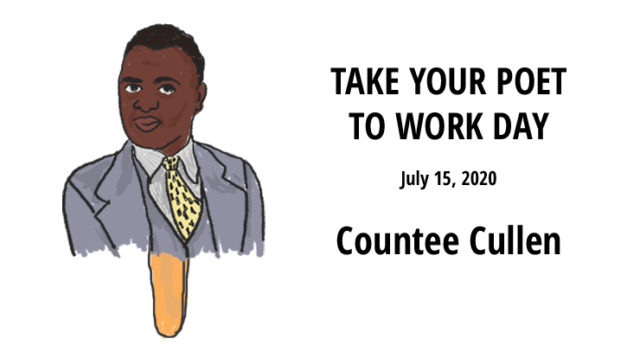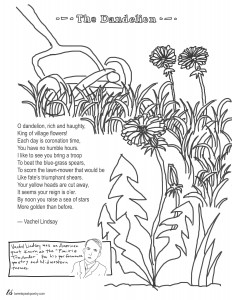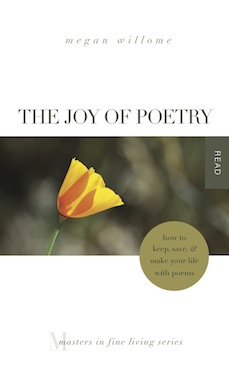I first encountered Countee Cullen, one of the newest additions to Take Your Poet to Work Day, when I was gifted a poetry collection during an interview for The Joy of Poetry. Author Elizabeth Crook said All the Silver Pennies is her go-to baby gift, and in it I found two poems by Cullen. 
I Have Wrapped My Dreams in a Silken Cloth
I have wrapped my dreams in a silken cloth
And laid them away in a box of gold,
Where long may cling the lips of the moth;
I have wrapped my dreams in a silken cloth.
I hide no hate; I am not even wroth
Who found life’s breath so keen and cold.
I have wrapped my dreams in a silken cloth
And laid them away in a box of gold.
— Countee Cullen
Every poem in this collection comes with a short introduction by the editor, Blanche Jennings Thompson. Because this is a book for children, the introduction is not intended to analyze or instruct — it’s an invitation. Here is how she introduces this poem:
Most human beings start out in life with dreams of success and happiness. Some achieve all their goals apparently almost without trying. Others, because of barriers of race, creed, color or physical condition are obliged to lay their dreams away and face an uncertain future. Have the successful of this world any obligation to help their less fortunate brothers? What are some of the best ways to help?”
Still good questions, fifty-three years after Thompson wrote those words.
The pen and ink drawing accompanying Cullen’s poem is of the “box of gold” and includes a padlock. Sometimes dreams need to be wrapped safe, locked tight.
Countee Cullen was a member of the Harlem Renaissance. In the introduction to Cullen’s collected poems, poet Major Jackson says although Cullen was one of the first poets published from that period — one marked by experimentation — his poetry harkened back to an older (read: Whiter) poetic style, featuring formal language that “seemed sponsored in sound and sense by a bygone era.”
But that doesn’t mean Cullen was stodgy. He had style and flair. He loved the poetry of John Keats and was known as the “Black Keats.” He found form poetry a freeing place to play.
“I Have Wrapped My Dreams in a Silken Cloth” only has eight lines, and five of them repeat. “Cloth” rhymes with “moth” and also with a word that definitely sounds of a bygone era: “wroth.” The poem is simple, yet elegant.
While I was memorizing I was also reading Uncle Tom’s Cabin, which is more of a page-turner than I expected. As I got to know Tom, George, Eliza, Cassy, and other characters who were enslaved, I began to imagine each of them wrapping their dreams in a silken cloth and laying them away in a box of gold. I suspect not all of Countee Cullen’s dreams came true. If we want a glimpse at what he laid away, all we need to do is read his poems.
That padlock is open.
Your Turn
Did you memorize “I Have Wrapped My Dreams in a Silken Cloth” this month? It won’t take long. Join our By Heart community and share your audio or video using the hashtags #ByHeart and #MemoriesWithFriends and tagging us @tspoetry. We also welcome photos of your handwritten copy of the poem.
By Heart for August
For the next By Heart gathering, August 28, we’ll learn “The Dandelion” by Vachel Lindsay. Time to reuse those colors you dug out for Take Your Poet to Work Day, because this one has its own coloring page!
Photo by John Lustig, Creative Commons, via Flickr. Post by Megan Willome.
Browse more By Heart
“Megan Willome’s The Joy of Poetry is not a long book, but it took me longer to read than I expected, because I kept stopping to savor poems and passages, to make note of books mentioned, and to compare Willome’s journey into poetry to my own. The book is many things. An unpretentious, funny, and poignant memoir. A defense of poetry, a response to literature that has touched her life, and a manual on how to write poetry. It’s also the story of a daughter who loses her mother to cancer. The author links these things into a narrative much like that of a novel. I loved this book. As soon as I finished, I began reading it again.”
—David Lee Garrison, author of Playing Bach in the D. C. Metro
- Perspective: The Two, The Only: Calvin and Hobbes - December 16, 2022
- Children’s Book Club: A Very Haunted Christmas - December 9, 2022
- By Heart: ‘The night is darkening round me’ by Emily Brontë - December 2, 2022



L.L. Barkat says
I like the way the dream is still treated as precious, though locked away. Treated tenderly, too. I wonder what a dream like that does over time, even if tucked into secrecy.
(For some reason the audio is silent. Not sure what that’s about. 🙂
Megan Willome says
Hm, I uploaded it again. It works on my phone, where it was recorded. Hope that helps.
I think the poem invites us to tuck away certain dreams.
Sandra Heska King says
So… I don’t remember ever reading Uncle Tom’s Cabin. I just downloaded it.
I’ve thrown away some dreams because after time they didn’t seem as important. But I’ve tucked a couple of precious ones away in hopes that maybe one day they will come true. The dreams aren’t for me.
This reminded me of MLK’s “I have a dream.”
The audio works for me.
Megan Willome says
Good to hear (on the audio).
Yes, there are dreams to keep and dreams to let go. The ones I find hardest to release are those for others.
The book is much more evangelical than I expected.